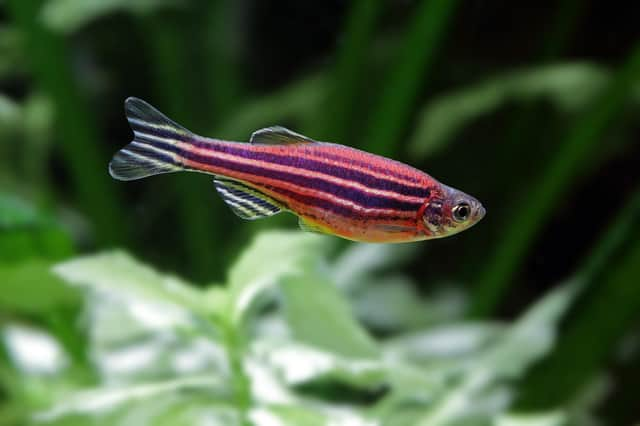New hope for Alzheimer's and Parkinson's treatment after University of Portsmouth researcher helps develops fish maze test


Dr Matt Parker, at the University of Portsmouth, is leading a team looking at how zebrafish swimming through a maze has the potential to improve progress in developing treatments for brain and psychiatric disorders, including Alzheimer’s disease, Parkinson’s disease, schizophrenia and anxiety.
Psychiatric disorders are usually diagnosed with a test on someone’s ability to think clearly, remember things and change in different circumstances.
Advertisement
Hide AdAdvertisement
Hide AdThe team designed a simple maze for the fish to explore and meant the team could analyse the fishes’ behaviour to see if any drugs affected any changes in their decisions.
Dr Parker said: ‘My group has developed a test of memory and decision-making in zebrafish and remarkably, human performance was indistinguishable to that of the animals.
‘This has huge implications for the development of drugs to treat such conditions.’
The test can help the team understand the mechanisms of complex brain disorders and the results could also mean more humane treatment for animals used in research for brain and psychiatric disorder treatments.
Advertisement
Hide AdAdvertisement
Hide AdDr Parker said: ‘It is very rare to find a non-invasive, humane test which can reliably improve diagnosis and be used to improve drug discovery using animal models of complex brain disorders that result in loss of memory and brain function.
‘The maze we developed lays the foundation of future research into a range of neurological disorders and could open new avenues of research into cognition and memory, allowing cross-species comparisons with exceptional translational relevance, minimal stress and reducing the number of test animals.
The researchers have also developed a virtual version of the maze and tested people in it.
Dr Parker added: ‘Our aim is to align cognitive testing in humans and animals and develop a task that can reliably target the same behavioural measures of thinking in a range of species, including humans, to improve progress for developing effective treatments for neurological and psychiatric disorders.’
Advertisement
Hide AdAdvertisement
Hide Ad‘In follow up studies we have been looking at how old age affects performance on the task, and have found some extremely promising results in both our fish and in older humans.
‘Additionally, we found that animals can be re-tested in the maze show very similar responses in re-testing, which opens the door to being able to reuse animals for pre and post drug exposure, reducing the overall number of animals required. The possibilities for this procedure are very exciting.’
A message from the Editor, Mark Waldron
Thank you for reading this story. The dramatic events of 2020 are having a major impact on our advertisers and thus our revenues.
The News is more reliant than ever on you taking out a digital subscription to support our journalism. You can subscribe here for unlimited access to Portsmouth news and information online.
Every subscription helps us continue providing trusted, local journalism and campaign on your behalf for our city.
Comment Guidelines
National World encourages reader discussion on our stories. User feedback, insights and back-and-forth exchanges add a rich layer of context to reporting. Please review our Community Guidelines before commenting.